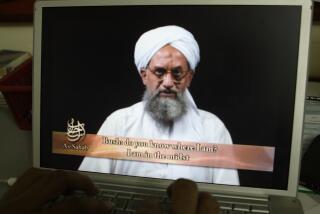Pakistan’s powerful spy agency gets a new chief
- Share via
ISLAMABAD, PAKISTAN — In a move that could herald changes in Pakistan’s approach toward Islamic militants, the government Tuesday named a new chief of its powerful intelligence agency.
Lt. Gen. Ahmed Shuja Pasha, the director-general of military operations, was appointed head of the Inter-Services Intelligence agency, or ISI, which has worked closely with the CIA and other U.S. intelligence groups. But the Pakistani agency is also tainted by historical ties -- which some observers say still exist -- to the Taliban and other militants.
The change in command appears to signal a desire on the part of the Pakistani government to alter at least the image, if not the fundamental mission, of its premier intelligence-gathering organization. The previous agency chief, Lt. Gen. Nadeem Taj, held the position for less than a year, an unusually short tenure at the helm of the ISI, which is sometimes described by critics as a “state within a state.”
Pakistan’s new government has attempted to assert some semblance of authority over the ISI but so far with only limited success. This year, Prime Minister Yusaf Raza Gillani was forced to back down from an effort to bring the agency’s command and control under the civilian Interior Ministry.
The announcement of the high-level shuffle was made by Pakistan’s military chief, Gen. Ashfaq Kayani, himself a former chief of the ISI. Kayani made it clear that the military would retain control of the agency’s day-to-day operations, though it ultimately reports to the prime minister.
The ISI is believed to have provided crucial help to the U.S. in finding several senior Al Qaeda and Taliban figures, but its loyalties and motives have been widely questioned.
Afghan authorities this year accused the agency of helping militant groups that bombed the Indian Embassy in Kabul, Afghanistan’s capital, and that tried to kill Afghan President Hamid Karzai. The Pakistani government denied involvement.
Pakistan’s willingness and ability to crack down on militants sheltering in the tribal lands along the Afghan border have been sharply questioned by senior Bush administration officials in recent months.
CIA Director Michael V. Hayden met with Pakistani President Asif Ali Zardari last week at the United Nations, the latest in a series of high-level meetings involving intelligence officials of the two countries.
In previous encounters, U.S. intelligence and military officials accused the ISI of tipping off Taliban targets to planned U.S. missile strikes and of providing support to militants behind the dramatic increase in violence seen in Afghanistan over the last year.
Still, officials of both countries downplayed suggestions that the change in ISI leadership had been engineered by the United States. Pakistan experts said the sudden switch reflected Kayani’s desire to assemble a team he trusts.
The ISI nurtured the Taliban in the 1990s as part of a regional strategy meant to counter India’s influence. The extremist movement, which was toppled by a U.S.-led invasion of Afghanistan nearly seven years ago, has since staged a resurgence.
--
Times staff writer Greg Miller in Washington contributed to this report. Special correspondent Zaidi reported from Islamabad and Times staff writer King from Istanbul, Turkey.
More to Read
Sign up for Essential California
The most important California stories and recommendations in your inbox every morning.
You may occasionally receive promotional content from the Los Angeles Times.













